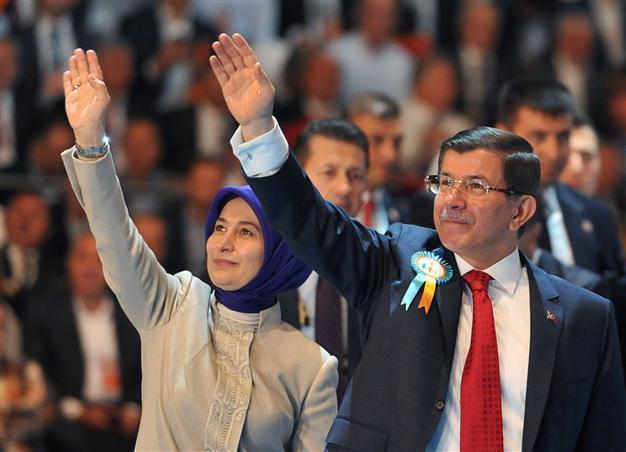AKP candidate list revised for Nov. 1 election
Nuray Babacan, Bülent Sarıoğlu - ANKARA

Turkish Prime Minister Ahmet Davutoglu (R) and his wife Sare greet their supporters as they arrive to attend the 5th edition of the ruling Justice and Development Party (AKP) annual congress in Ankara, on September 12, 2015, ahead of snap November 1 elections. AFP Photo
Weeks to go to Nov. 1 snap elections, the deadline for political parties to submit their candidate lists to the country’s top election authority ends on Sept. 18, with the Justice and Development Party (AKP) initiating a major revision to their previous list of the June 7 elections.
The main opposition social democrat Republican People’s Party (CHP) plans to apply a new formula in order to raise its share of votes, while neither the Nationalist Movement Party (MHP) nor the Peoples’ Democratic Party (HDP), both with 80 seats from the previous election, are expected to make dramatic changes in their lists.
The AKP’s revision, which follows an overhaul of the party’s significant decision-making bodies at its Sept. 12 congress, has been carried out in coordination between party leadership and President Recep Tayyip Erdoğan’s inner circle.
The biggest changes will be seen in 12 eastern and southeastern Anatolian provinces, in addition to Istanbul, as the party leadership has focused on eliminating “list mistakes,” which it believes led to 9 percent decrease in overall votes.
According to the official results announced on June 18 by the Supreme Election Board (YSK), the AKP received 40.66 percent of the vote, while the CHP won 25.13 percent, the MHP 16.45 percent and the HDP 12.96 percent.
Accordingly, the AKP has 258 seats in the 550-seat parliament and the CHP has 132. The MHP and HDP have 80 seats apiece. The AKP, therefore, failed to secure the majority in the 550-seat parliament required to rule alone, compared to the previous elections in 2011 in which it won almost 50 percent of the vote.
The June 7 elections were the first ever parliamentary elections that the AKP entered without President Erdoğan’s leadership, instead led by Prime Minister Ahmet Davutoğlu who was elected as party leader in August 2014 after Erdoğan became president in a popular vote. At this year’s party congress, Davutoğlu was reelected as party leader.
While renewing its lists, particularly in the predominantly Kurdish populated provinces in the eastern and southeastern provinces, the party has reviewed its discourse concerning the Kurdish issue and taken polls conducted in separate provinces into consideration.
The AKP plans to nominate candidates with nationalist tendencies in the western part of the country and candidates esteemed by locals in the east and the southeast.
AKP’s leader Davutoğlu is expected to present the candidates at a gathering held at Ankara’s Arena Sports Hall on Sept. 21.
The CHP frontThe CHP has planned changes on lists for 35 provinces from which it couldn’t win any seats in the June 7 vote. In provinces where it managed to win two or three seats, it plans to put stronger candidates respectively on third and fourth rows in order to increase its votes there, with a method it calls its “plus one formula.”
In provinces such as Adıyaman, Ardahan and Kahramanmaraş where his party couldn’t get any seats, CHP leader Kemal Kılıçdaroğlu plans to change first row on tickets as well. Accordingly, the CHP will nominate Turkey’s former consul-general Öztürk Yılmaz, who was among the 49 people kidnapped by the Islamic State of Iraq and the Levant (ISIL) for 101 days and released in September 2014, as its first row candidate for Ardahan.
In provinces where votes assumed to have been moved from the CHP to the HDP, like Gaziantep, Hatay and Mersin, Kılıçdaroğlu has done some fine-tuning as well.
No major changes in HDP, MHPOther than Murat Başesgioğlu, who announced his leave from politics, and Deputy Prime Minister Tuğrul Türkeş, who was expelled from the party after accepting an offer to join the country’s interim cabinet, the MHP will not see a major change in lists.
The HDP, meanwhile, will only replace some of its candidates who are not eager to re-run for parliament after a five month hiatus. HDP Istanbul deputy Levent Tüzel, a former leader of the Labor Party (EMEP), who refused to take part in the interim government on his original party’s reasoning, is one of those deputies who didn’t apply to re-run.
